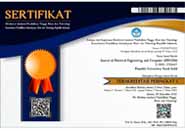Design of Multi Way Charging Hover Board
(1) * Rajesh Tanna
 (VIGNAN'S INSTITUTE OF INFORMATION TECHNOLOGY DUVVADA)
(VIGNAN'S INSTITUTE OF INFORMATION TECHNOLOGY DUVVADA) India
(2) Arundhathi Bhratham (VIGNAN'S INSTITUTE OF INFORMATION TECHNOLOGY DUVVADA)
India
(3) Vamseekrishna Allam (Ragu Engineering college dakamarri)
India
(*) Corresponding Author
AbstractThe main aim of this paper is to develop a hover board, which can be charged through battery as well as solar panels. It is a two way charging hover board. This kind of vehicle is interesting since it contains a lot of technology considered as a solution for future needs of the world relevant to an environment friendly and energy efficient transportation industry. The hover board consists of a metal frame on which the hardware is assembled in such a way that it works on the principle of balancing robot. The user have to stand on the segway and by applying the pressure, the infrared signals gets blocked by the pedal sensor and then the signal is given to the mother board to control the speed. The natural movements of the rider (lean forwards or backwards in combination) should be the rider input required to ride the vehicle (self-balancing personal transporter) consisting of two motorized wheels connected to a pair of articulated pads on which the rider places their feet and applies pressure for the movement of vehicle. The rider has to control the speed by leaning forward or backward and for turns by twisting the pads. The solar panels are connected to voltage booster circuit so as to charge the battery naturally and minimizing the use of fuel for short distance travelling. |
Keywords
Full Text: PDF
Refbacks
- There are currently no refbacks.
Copyright (c) 2021 RAJESH TANNA, Arundhathi Bhratham, vamseekrishna allam









